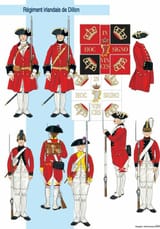Search Results
7/9/2025, 9:47:26 AM
>>509902143
>The Irish Brigade became one of the elite units of the French Army. While increasingly diluted by French and foreign recruits from elsewhere in Europe, its Irish-born officers and men often aspired to return to aid Ireland and regain their ancestral lands, as some did during the Jacobite Rebellion of 1745
>Irish regiments participated in most of the major land battles fought by the French between 1690 and 1789, particularly Steenkirk (1692), Neerwinden (1693),Marsaglia (1693), Blenheim (1704), Almansa (1707), Malplaquet (1709), Fontenoy (1745), Battle of Lauffeld (1747); and Rossbach (1757)
>They also remained strongly attached to the Jacobite cause, taking part in the rising of 1715 and the rising of 1745. For the latter, a composite battalion of infantry ("Irish Picquets") comprising detachments from each of the regiments of the Irish Brigade, plus one squadron of cavalry, was sent to Scotland. This force saw action at the second Battle of Falkirk (where they cemented the victory by driving off the Hanoverians causing the clans to waver) and Culloden, alongside the regiment of Royal Scots (Royal Ecossais) which had been raised the year before in French service. As serving soldiers of the French King the Irish Picquets were permitted to formally surrender after Culloden with a promise of honourable treatment, and were not subjected to the reprisals suffered by the Highland clansmen. Many other exiled Jacobites in the French army were captured en route to Scotland in late 1745 and early 1746, including significantly, Charles Radcliffe, 5th Earl of Derwentwater, a captain in Dillon's regiment who was executed in London in 1746
>Freemasonry in Ireland is the second oldest system in the world and the first evidence for its formally institutionalized existence comes from the Dublin Weekly Journal of June 26th 1725
>The Irish Brigade became one of the elite units of the French Army. While increasingly diluted by French and foreign recruits from elsewhere in Europe, its Irish-born officers and men often aspired to return to aid Ireland and regain their ancestral lands, as some did during the Jacobite Rebellion of 1745
>Irish regiments participated in most of the major land battles fought by the French between 1690 and 1789, particularly Steenkirk (1692), Neerwinden (1693),Marsaglia (1693), Blenheim (1704), Almansa (1707), Malplaquet (1709), Fontenoy (1745), Battle of Lauffeld (1747); and Rossbach (1757)
>They also remained strongly attached to the Jacobite cause, taking part in the rising of 1715 and the rising of 1745. For the latter, a composite battalion of infantry ("Irish Picquets") comprising detachments from each of the regiments of the Irish Brigade, plus one squadron of cavalry, was sent to Scotland. This force saw action at the second Battle of Falkirk (where they cemented the victory by driving off the Hanoverians causing the clans to waver) and Culloden, alongside the regiment of Royal Scots (Royal Ecossais) which had been raised the year before in French service. As serving soldiers of the French King the Irish Picquets were permitted to formally surrender after Culloden with a promise of honourable treatment, and were not subjected to the reprisals suffered by the Highland clansmen. Many other exiled Jacobites in the French army were captured en route to Scotland in late 1745 and early 1746, including significantly, Charles Radcliffe, 5th Earl of Derwentwater, a captain in Dillon's regiment who was executed in London in 1746
>Freemasonry in Ireland is the second oldest system in the world and the first evidence for its formally institutionalized existence comes from the Dublin Weekly Journal of June 26th 1725
Page 1
